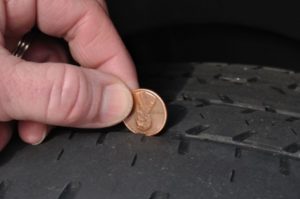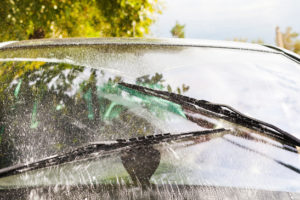The winter months put your vehicle to the test. Automotive repairs and maintenance can fall by the wayside when temperatures are high and ice storms are not threatening the forecast, but the rest of the year can be challenging for some vehicles, especially those that have not been properly maintained. It’s important to winterize your vehicle to make sure that your vehicle is ready for whatever the season might have in store. Read on to find out the most important steps you can take to make sure that your commute goes smoothly into the holidays and the new year.
Check and replace tires as needed
 Although Atlanta residents likely will not be shoveling snow this winter, getting your vehicle ready for the winter season is a necessity for all car owners. Ice presents a nasty problem for anyone, especially those of us on the road. While we can’t control conditions on the road, we can control how prepared we are for poor diving conditions. The best way to do that is to make sure that our tires are maintained and working properly.
Although Atlanta residents likely will not be shoveling snow this winter, getting your vehicle ready for the winter season is a necessity for all car owners. Ice presents a nasty problem for anyone, especially those of us on the road. While we can’t control conditions on the road, we can control how prepared we are for poor diving conditions. The best way to do that is to make sure that our tires are maintained and working properly.
Tread is the name of the game when evaluating a tire’s winter preparedness. When a tire reaches roughly 4/32 of an inch in the remaining tread, that tire needs a replacement. As a rule of thumb, simply insert a quarter into a tire’s groove, and if Lincoln’s head is fully visible, you have less than 4/32 of an inch of tread, and that tire should be replaced.
Bald tires are one of the easiest ways to get in an accident, especially when precipitation is heavier than usual. Any time that the level of standing water on the road is greater than the tread of your tires, hydroplaning is much more likely to occur. And there is no easier way to end up in an accident than losing the ability to direct and stop a vehicle, which is the case when hydroplaning occurs.
Of course, things like tire pressure are also key in ensuring that those tires are ready for winter. If they are regularly deflating, make sure to have them checked to ensure that they have not been punctured. Also, keep in mind that tire pressure falls with temperature. For every 10 degrees change in temperature, your tires will lose roughly 1 PSI; in short, check your tire pressure more often when it’s cold out. According to the National Highway Traffic Safety Administration, 738 crashes occurred in 2017 in the US due to malfunctioning tires. Don’t let that be you: make sure that all of your vehicle’s tires are in the best of shape.
Ensure that you’re positioned for optimal visibility
 Another acid test for the readiness of your vehicle for winter is whether it is set up for optimal visibility in poor weather conditions. A de-icer is a must-have when conditions turn sub-zero. Properly functioning wipers is also key.
Another acid test for the readiness of your vehicle for winter is whether it is set up for optimal visibility in poor weather conditions. A de-icer is a must-have when conditions turn sub-zero. Properly functioning wipers is also key.
Check to see if they are leaving streaks on the window, or if the blades show signs of cracking. These are giveaways that your wipers should be replaced. And, of course, working wipers should always be paired with proper levels of window washing fluid which contains an anti-freeze.
Have your vehicle inspected for the health of its…..
 Vehicle inspection is another prudent measure to best winterize your vehicle. There are a variety of automotive problems that can be exacerbated or caused by cold and freezing weather.
Vehicle inspection is another prudent measure to best winterize your vehicle. There are a variety of automotive problems that can be exacerbated or caused by cold and freezing weather.
…battery
One is battery health: the chemical reactions which start a car’s battery are slowed down in colder weather. As a result, it can be more difficult for the battery to start, especially one which was already in marginal health. A mechanic will be able to test your battery and decide if it needs to be changed. They will also be able to identify any corrosion surrounding the battery, something which will affect its performance in even the best of weather.
…belts and hoses
Another is the soundness of your engine’s belts and hoses. These will always function worse in freezing weather, and a belt that’s exhibiting signs of extreme wear will more likely snap when exposed to poor weather conditions. A technician will be able to identify any likely such culprits and might be able to fix something that would later otherwise leave you stranded on the highway.
…oil
A technician will also be able to identify the right type of oil for your car over the winter months. An oil’s viscosity will impact how effective it is in colder temperatures; your car might require a thinner, less viscous which might otherwise not function properly over the winter.
Winterize Your Vehicle at T3 Atlanta This Year
Winterize your vehicle at T3 Atlanta. Our team will be able to provide you with good, solid advice on how an Atlanta commuter can best prepare for the winter months so that they are not causing unnecessary damage to their vehicle or setting themselves up for dreaded “roadside assistance”. Our convenient Smyrna and Decatur locations make it easy for you to get your car ready for whatever weather the winter has in store.










Leave a Reply
You must be logged in to post a comment.